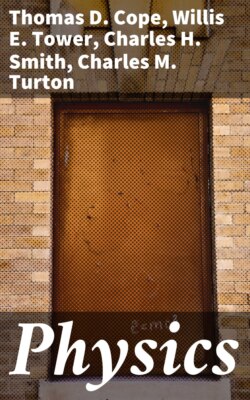Читать книгу Physics - Willis E. Tower - Страница 5
На сайте Литреса книга снята с продажи.
(1) Introduction
ОглавлениеTable of Contents
1. Physics, an Explanation of Common Things.—Many students take up the study of physics expecting to see wonderful experiments with the "X" rays, wireless telegraphy, dynamos, and other interesting devices. Others are dreading to begin a study that to them seems strange and difficult, because they fear it deals with ideas and principles that are beyond their experience and hard to comprehend.
Each of these classes is surprised to learn that physics is mainly an explanation of common things. It is a study that systematizes our knowledge of the forces and changes about us; such as the pull of the earth, the formation of dew, rain and frost, water pressure and pumps, echoes and music, thermometers and engines, and many other things about us with which people are more or less familiar. Physics is like other school subjects, such as mathematics and language, in having its own peculiar vocabulary and methods of study; these will be acquired as progress is made in the course.
The most useful habit that the student of physics can form is that of connecting or relating each new idea or fact that is presented to him to some observation or experience that will illustrate the new idea. This relating or connecting of the new ideas to one's own personal experience is not only one of the best known means of cultivating the memory and power of association, but it is of especial help in a subject such as physics, which deals with the systematic study and explanation of the facts of our every-day experience.
2. Knowledge—Common and Scientific.—This leads to the distinction between common knowledge and scientific knowledge. We all possess common knowledge of the things about us, gained from the impressions received by our senses, from reading, and from the remarks of others. Scientific knowledge is attained when the bits of common knowledge are connected and explained by other information gained through study or experience. That is, common knowledge becomes scientific, when it is organized. This leads to the definition: Science is organized knowledge.
Common knowledge of the forces and objects about us becomes scientific only as we are able to make accurate measurements of these. That is, science is concerned not only in how things work, but even more in how much is involved or results from a given activity. For example, a scientific farmer must be able to compute his costs and results in order to determine accurately his net profits. The business man who is conducting his business with efficiency knows accurately his costs of production and distribution.
This book is written in the hope that it will make more scientific the student's common knowledge of the forces and changes in the world about him and will give him many ideas and principles that will help him to acquire the habit of looking from effects to their natural causes and thus tend to develop what is called the scientific habit of thought.
3. Hypothesis, Theory, and Law.—Three words that are frequently used in science may be mentioned here: hypothesis, theory, and law. An hypothesis is a supposition advanced to explain some effect, change, or condition that has been observed. For example, the Nebular Hypothesis of which many high-school students have heard, is an attempt to explain the origin of the sun, the earth, the planets, and other solar systems.
A theory is an hypothesis which has been tested in a variety of ways and which seems to fit the conditions and results so that it is generally accepted as giving a satisfactory explanation of the matter in question. The Molecular Theory of Matter which states that matter of all kinds is composed of very small particles called molecules (see Art. 6), is a familiar example of a theory.
A theory becomes a law when it may be definitely proved. Many laws are expressed in mathematical language, e.g., the law of gravitation. (See Art. 88.) Many of the laws of physics are illustrated by laboratory experiments, which show in a simple way just what the law means.
